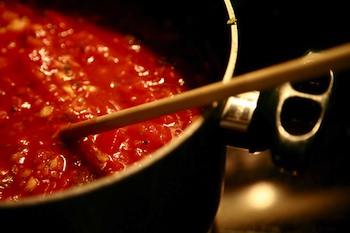 The homemade spaghetti sauce I cooked up a few weeks ago was rich, flavorful — just downright extraordinary.
The homemade spaghetti sauce I cooked up a few weeks ago was rich, flavorful — just downright extraordinary.
I attribute most of that to the quality of the ingredients — something about organic farm fresh tomatoes, new onions, fresh oregano, real garlic, and a touch of hot sauce to add a bit of a zing. Yet I’ve used those same ingredients before and the sauce never had the unique flavor of this batch. There must be something to the love, to the passion that becomes part of the process. No longer a strict recipe follower when I’m putting together a dish I’ve made before, there is the possibility of an extra large clove of garlic, or maybe dried oregano instead. . . such dishes are always evolving, responding to conditions at hand.
While I was washing the pot in which my spaghetti sauce simmered to take on all its goodness, similarities to our Powerful Learning Practice Connected Coaching pilot struck me. That experience was downright extraordinary too.
The ingredients were topnotch. Our 6 coaches, all accomplished educators– Brenda Sherry, Marsha Ratzel, Zoe Branigan-Pipe, John Pearce, Mark Carbone, and Chad Evans— brought their own gits and talents to deep discussions around coaching, and they entered their online communities with enthusiasm and passion. Our unique model was well flavored by dashes of Tschannen-Morans’ Evocative Coaching, Costa/Garmston’s Cognitive Coaching, Knight’s Instructional Coaching and Dana/Yendel-Hoppey’s Coaching Inquiry-oriented Communities. The zing emanated from Dean Shareski’s exceptional vision and expertise for leveraging images & video and moving beyond text in online spaces — and from Sheryl Nussbaum-Beach’s brilliant insights around developing community.
The coaching process, unlike the sauce, lacked any prescriptive recipe and was not one we’d tried before; we let it simmer a bit, added a bit more of Tschannen-Moran and Knight, turned down the heat for a while, then back to a simmer, not unlike our description of the model as one of wayfinding with looping back, checking pathmarkers (building trust, questioning, and facilitating design thinking).
I’m guessing the inquiry based appreciative elements (think more than dashes of Tshannen-Morans) increased the likelihood of such an exemplary experience. And unlike the sauce, our coaching was a collaborative process. The joy, the rush that comes from engagement in collegial conversations around difficult topics can not be overstated.
In focus sessions, we attempted to distinguish the specific ingredients or parts of the process that led to such a remarkable experience; we were unable to do so. We were in total agreement that the ingredients and the process intertwined into a model for coaching in online spaces that should be replicated — again.
Like the spaghetti sauce, the grand aftertaste leads to a longing for more.
Additional opportunities for connected coaches are simmering:
Our focus is on learning first and using emerging technologies to make that happen. But many teachers simply don’t understand how to create and sustain blended classroom instruction. Our connected coaches use an appreciative inquiry methodology to help educators think through designing, building, and supporting technology-rich learning environments that support student learning. — from Work for us: be a PLP Connected Coach
I can’t wait. And the Connected Coaches to come will have Dean, Sheryl, Marsha, Brenda, Zoe, John, Chad and Mark to thank for infusing their creativity and imagination — their passion and perseverance — as we concocted Connected Coaching in 2011.
Photo: mrjoro, Creative Commons
Lani Ritter Hall
Latest posts by Lani Ritter Hall (see all)
- Through new lenses– - January 5, 2015
- Connected Coaching: Reflections & a new course starting soon! - September 24, 2013
- Virtual Classroom Visit — Sketch Up and Google Hangouts in a 3rd grade classroom - April 15, 2013

